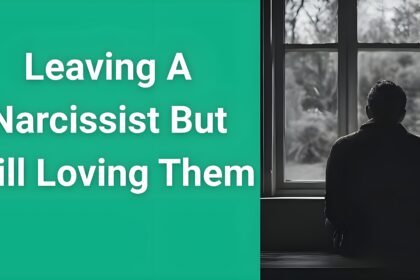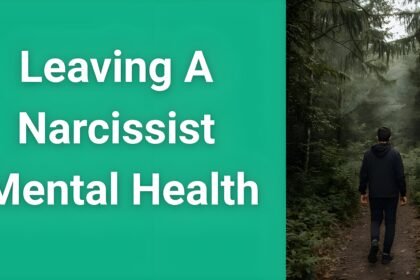The decision to start leaving a covert narcissist often feels like standing at the edge of an emotional cliff. One moment you're questioning whether you're overreacting, and the next you're desperately googling at 3 AM, searching for validation that what you're experiencing is real abuse. If you've found this article, chances are you're ready to reclaim your life from someone who has systematically eroded your sense of reality, self-worth, and sanity.
Unlike their grandiose counterparts, covert narcissists operate in shadows, making their abuse particularly insidious and difficult to identify. They weaponize kindness, play the victim masterfully, and leave you feeling guilty for even considering that they might be the problem. The thought of leaving feels simultaneously urgent and impossible.
But here's what you need to know: leaving a covert narcissist is not only possible—it's essential for your psychological survival. This comprehensive guide will walk you through everything you need to know about safely and strategically extracting yourself from a covert narcissist's web of manipulation.
Understanding Why Leaving a Covert Narcissist Feels Impossible
The Invisible Chains of Covert Narcissistic Abuse
When people think of narcissistic abuse, they often envision obvious behaviors: screaming, obvious manipulation, or grandiose displays of superiority. Covert narcissists, however, specialize in subtle psychological warfare that leaves no visible bruises but devastates your mental health just as effectively.
The covert narcissist's arsenal includes:
- Passive-aggressive punishment disguised as “sensitivity”
- Playing the victim when confronted about harmful behavior
- Withholding affection, communication, or support as control tactics
- Subtle sabotage of your goals, relationships, or self-esteem
- Gaslighting that makes you question your own perceptions
- Creating trauma bonds that feel like love but function like addiction
The Neurological Reality of Trauma Bonding
Your difficulty in leaving a covert narcissist isn't a character flaw—it's neuroscience. The intermittent reinforcement schedule of kindness followed by cruelty creates biochemical addiction pathways in your brain similar to those found in substance abuse. Your nervous system literally believes you need this person to survive, even when your logical mind knows they're destroying you.
This trauma bonding explains why:
- You feel physically ill when considering leaving them
- You obsessively check their social media despite knowing it hurts
- You find yourself making excuses for their behavior to others
- You feel more attached to them during the worst periods of abuse
- Logic and willpower alone haven't been enough to break free
The Covert Narcissist's Predictable Response to Being Left
Phase 1: Disbelief and Dismissal
Initially, the covert narcissist won't take your departure seriously. Their inflated sense of entitlement makes them genuinely believe that no one would choose to leave them. They've likely witnessed you return before, reinforcing their belief that this time will be no different.
During this phase, expect:
- Minimal effort to contact you directly
- Subtle social media surveillance and interaction with your posts
- Casual mentions of you to mutual friends, fishing for information
- Passive-aggressive behavior if you still live together or share spaces
Phase 2: The Victim Performance
When reality sets in that you're serious about leaving, the covert narcissist launches into their signature victim performance. This isn't conscious manipulation—they genuinely experience your boundary-setting as an attack against them.
Common victim tactics include:
- Telling mutual friends and family that you “abandoned” them
- Sharing carefully curated details about their “confusion” and “hurt”
- Highlighting any mental health struggles or life difficulties
- Painting themselves as the long-suffering partner who tried everything
- Creating narratives where your leaving proves their unworthiness stories
Phase 3: Escalation and Retaliation
If playing the victim doesn't bring you back, expect the covert narcissist's behavior to escalate. Remember, they view you as property rather than a person with autonomous rights. Your continued absence represents a loss of control they cannot tolerate.
Escalation tactics may include:
- Intense hoovering attempts with promises of change
- Recruiting flying monkeys to pressure you into returning
- Sabotaging your professional or personal relationships
- Financial manipulation if you share resources
- Threatening self-harm to manipulate your guilt and empathy
- Legal harassment in cases involving children or shared property
Your Step-by-Step Blueprint for Leaving a Covert Narcissist
Step 1: Document Everything Before You Leave
The covert narcissist's greatest weapon is plausible deniability. Their abuse is often so subtle that even you question whether it really happened. Before taking any action, create an undeniable record of their behavior.
Essential documentation includes:
- Screenshot concerning text messages, emails, or social media interactions
- Keep a detailed journal of incidents with dates, times, and specific behaviors
- Record any financial control or manipulation tactics
- Document any threats, even subtle ones
- Save evidence of their public persona versus private behavior
- Record instances of gaslighting or reality distortion
Store this documentation somewhere the covert narcissist cannot access—cloud storage, a trusted friend's device, or a safety deposit box.
Step 2: Build Your Support Network in Secret
Covert narcissists excel at isolating their victims from potential support systems. Before leaving, quietly rebuild connections with people who can offer emotional, practical, or financial support during your transition.
Strategic relationship building:
- Reconnect with family members or friends you've drifted from
- Identify trustworthy colleagues who might offer professional support
- Research local support groups for narcissistic abuse survivors
- Consider finding a therapist who specializes in narcissistic abuse
- Connect with online communities of survivors for validation and advice
Remember: share your plans only with people you completely trust. The covert narcissist likely has allies in your social circle who will report back to them, intentionally or not.
Step 3: Secure Your Financial Independence
Financial control is a cornerstone of covert narcissistic abuse. Even if the control seems benevolent—like them “taking care” of finances to “reduce your stress”—it's designed to make leaving impossible.
Financial preparation steps:
- Open a separate bank account in your name only
- Gradually redirect a portion of your income to this secret account
- Gather important financial documents and store copies safely
- Research your legal rights regarding shared property and accounts
- Begin building credit independently if necessary
- Save cash for immediate needs during your departure
- Secure valuable personal items they might use as leverage
Step 4: Create Your Physical Exit Strategy
Leaving a covert narcissist requires careful timing and execution. Unlike overt narcissists who might explode immediately, covert narcissists may appear calm while secretly planning retaliation.
Safe departure planning:
- Choose a time when the narcissist will be away for several hours
- Prepare essential items in advance: legal documents, medications, clothing, sentimental items
- Arrange temporary housing with trusted friends, family, or domestic violence resources
- Plan transportation that doesn't rely on shared vehicles
- Consider having trusted friends help with the actual move
- Prepare your children (if applicable) without alarming them prematurely
Important note: If you share children with the covert narcissist, consult with a family law attorney before leaving to understand your rights and obligations. Improper departure could be used against you in custody proceedings.
Step 5: Master the Art of Gray Rock Communication
Before, during, and after your departure, you may need to maintain some contact with the covert narcissist—especially if you share children, workplace, or legal obligations. The Gray Rock method helps protect your emotional energy during necessary interactions.
Gray Rock principles:
- Provide only factual, necessary information
- Avoid emotional reactions to their provocations
- Keep responses brief and boring
- Don't share personal details about your new life
- Refuse to engage in arguments or justifications
- Maintain strict boundaries around communication methods and timing
Example of Gray Rock communication: Their text: “I can't believe you would abandon me like this after everything I've done for you. I'm devastated and don't understand how you could be so cruel.”
Gray Rock response: “I understand you're upset. I need space to work on myself right now.”
Step 6: Prepare for the Trauma Bond Withdrawal
The days and weeks following your departure will likely be emotionally brutal. Your nervous system, accustomed to the chaos of living with a covert narcissist, may interpret the calm of your new situation as danger.
Common withdrawal symptoms include:
- Intense cravings to contact them or check their social media
- Physical symptoms like anxiety, insomnia, or digestive issues
- Overwhelming guilt or second-guessing your decision
- Romanticizing the good times while minimizing the abuse
- Feeling emotionally numb or disconnected from yourself
- Panic attacks when facing the reality of building a new life
Step 7: Implement Emergency Protocols for Weak Moments
During withdrawal, your rational mind may be temporarily hijacked by trauma bonding. Prepare specific protocols for moments when the urge to return feels overwhelming.
Emergency protocol toolkit:
- Create a “reality list” detailing specific abusive behaviors to read during weak moments
- Develop a 90-second panic attack stopping technique using breathing and grounding
- Identify three people you can call immediately when feeling vulnerable
- Prepare alternative activities for times you'd normally contact them
- Remove their contact information and block them on all platforms
- Ask trusted friends to monitor your social media activity if necessary
Advanced Strategies for Different Covert Narcissist Types
The Vulnerable Narcissist: When They Play the Wounded Victim
This type weaponizes their perceived victimhood, making you feel guilty for causing them pain. They may threaten self-harm, share tragic backstories, or emphasize their mental health struggles to manipulate your empathy.
Specific strategies:
- Remember that their emotional regulation is not your responsibility
- Document any threats of self-harm and report them to appropriate authorities
- Recognize that their vulnerability displays are often calculated performances
- Maintain boundaries even when they appear genuinely distressed
The Intellectual Narcissist: When They Use Logic Against You
These covert narcissists use superior intelligence or education to undermine your decision-making. They may pathologize your choice to leave, use psychological terminology against you, or present elaborate rational arguments for why leaving is misguided.
Counter-strategies:
- Trust your emotional experience over their intellectual arguments
- Refuse to engage in debates about your decision to leave
- Remember that emotional abuse doesn't become acceptable through clever reasoning
- Seek validation from mental health professionals who understand narcissistic abuse
The Communal Narcissist: When They Hide Behind Good Deeds
This type maintains their public image through charitable work, community involvement, or religious activity. They may use their reputation to discredit your experiences or present your leaving as ungrateful or selfish.
Protective approaches:
- Document the contrast between their public and private behavior
- Connect with other survivors who may have experienced similar discrepancies
- Find support outside their sphere of influence
- Remember that public generosity doesn't excuse private abuse
Rebuilding Your Life After Leaving a Covert Narcissist
The Identity Recovery Process
After months or years with a covert narcissist, you may feel like you've lost touch with your authentic self. This identity erosion is intentional—narcissists need you to be a blank canvas they can project onto and manipulate.
Identity reclamation steps:
- Rediscover activities, interests, and values you abandoned during the relationship
- Reconnect with aspects of your personality that were criticized or suppressed
- Set new goals based on your authentic desires rather than their expectations
- Practice making decisions without seeking anyone else's approval or validation
- Allow yourself to feel angry about the time and energy that was stolen from you
Healing the Nervous System Damage
Living with a covert narcissist creates chronic stress that physically alters your nervous system. Healing requires intentional practices that restore your sense of safety and calm.
Nervous system repair techniques:
- Develop a consistent sleep routine to restore natural circadian rhythms
- Practice grounding techniques that connect you to the present moment
- Engage in regular physical activity to release trapped trauma energy
- Learn breathing techniques that activate your parasympathetic nervous system
- Consider trauma-informed therapies like EMDR or somatic experiencing
Protecting Yourself from Future Covert Narcissists
Understanding Your Vulnerability Patterns
Most people who end up with covert narcissists share certain traits that make them attractive targets: high empathy, people-pleasing tendencies, strong caregiving instincts, and often histories of childhood emotional neglect or trauma.
Vulnerability assessment questions:
- Do you feel responsible for other people's emotional states?
- Do you have difficulty saying no to requests for help or time?
- Do you tend to make excuses for other people's problematic behavior?
- Are you drawn to people who seem to need rescuing or healing?
- Do you prioritize others' needs over your own as a matter of routine?
Red Flag Recognition Training
Covert narcissists are skilled at presenting themselves as ideal partners, friends, or colleagues during initial interactions. Learning to recognize subtle early warning signs can prevent future entanglements.
Early red flags include:
- Love bombing or excessive attention early in the relationship
- Subtle criticism disguised as helpful observations or jokes
- Difficulty accepting no for an answer, even about small things
- Stories that paint them as perpetual victims in past relationships
- Boundary testing through “jokes” or “misunderstandings”
- Inconsistency between their words and actions
- Making you feel guilty for having other relationships or interests
Special Considerations for Complex Situations
When You Share Children with a Covert Narcissist
Leaving a covert narcissist becomes exponentially more complex when children are involved. The narcissist will likely use the children as weapons to maintain control and continue the abuse through parental alienation tactics.
Child protection strategies:
- Document all interactions related to the children
- Maintain detailed records of their parenting (or lack thereof)
- Seek therapy for your children with professionals who understand narcissistic abuse
- Learn about parental alienation and how to counteract it
- Follow all legal procedures precisely to maintain your credibility
- Focus on being the stable, consistent parent your children need
When You Work with or for a Covert Narcissist
Professional relationships with covert narcissists present unique challenges, especially when leaving isn't immediately possible due to financial obligations.
Workplace survival tactics:
- Document all professional interactions via email when possible
- Build relationships with colleagues outside the narcissist's influence
- Focus on measurable performance metrics they cannot distort
- Avoid sharing personal information that could be used against you
- Begin networking for alternative employment opportunities
- Consider consulting with an employment attorney if harassment occurs
Frequently Asked Questions
How long does it take to heal after leaving a covert narcissist?
Healing from covert narcissistic abuse is a process, not an event. Most survivors report significant improvement within 6-12 months of no contact, with deeper healing continuing for several years. The timeline depends on factors like the duration of the relationship, the severity of abuse, your support system, and whether you pursue professional help.
What if I have to maintain contact due to children or work?
When no contact isn't possible, implement strict “gray rock” communication and maintain emotional boundaries. Focus only on necessary logistics, avoid personal topics, and document all interactions. Consider parallel parenting rather than co-parenting if children are involved.
Will the covert narcissist ever leave me alone?
Covert narcissists rarely give up entirely on former sources of supply. However, consistent boundary enforcement and lack of emotional response typically reduces their attempts over time. Some may persist for months or years, especially if you represent a significant loss of control for them.
How do I explain the situation to friends and family who don't understand?
Covert narcissistic abuse is difficult for others to understand because the abuser often presents well publicly. Share specific examples rather than general descriptions, recommend resources about covert narcissism, and remember that some people may never fully understand. Focus on building relationships with those who believe and support you.
Is it normal to miss them despite the abuse?
Missing your abuser is completely normal and doesn't mean you made the wrong decision. Trauma bonding creates genuine neurological attachments that take time to dissolve. You may miss the person you thought they were, the potential you saw in them, or the stability (even if chaotic) of the familiar relationship.
How can I trust myself in future relationships?
Rebuilding trust in your judgment takes time and often professional support. Start by learning to recognize your own needs and boundaries, practice saying no in low-stakes situations, and consider working with a therapist who understands narcissistic abuse patterns. Many survivors benefit from taking a period of intentional singleness to reconnect with themselves before dating again.
Conclusion: Your Freedom is Worth Fighting For
Leaving a covert narcissist represents one of the most courageous acts of self-preservation you can take. The process is neither quick nor easy, but every step toward freedom is a victory worth celebrating. You deserve relationships built on genuine respect, mutual support, and authentic love—not manipulation, control, and conditional affection.
Remember that the covert narcissist's greatest power lies in your belief that leaving is impossible or that you somehow deserve their treatment. By reading this article and taking even small steps toward freedom, you're already proving them wrong. Your future self is depending on the courage you show today.
The path ahead may feel uncertain, but it leads toward rediscovering your authentic self, rebuilding your sense of worth, and creating the peaceful, fulfilling life you deserve. You've survived their worst—now it's time to thrive in your freedom.
If you need additional support during this challenging time, consider exploring resources specifically designed for survivors of narcissistic abuse. Professional guidance can provide the personalized strategies and validation you need to navigate this journey successfully. Remember: you don't have to face this alone, and seeking help is a sign of strength, not weakness.
If you found this guide helpful, you may benefit from specialized resources designed specifically for survivors of covert narcissistic abuse. The 30 Day Trauma Bond Recovery Workbook offers a structured, science-based approach to breaking the neurological addiction that keeps you connected to your abuser. For those needing personalized guidance, a Narcissistic Abuse Clarity Report can provide expert analysis of your specific situation and tailored strategies for your unique circumstances.






